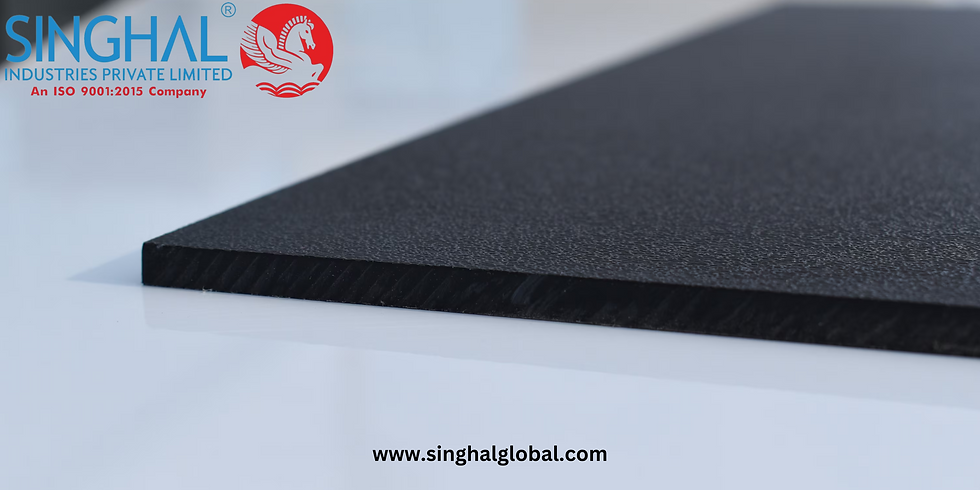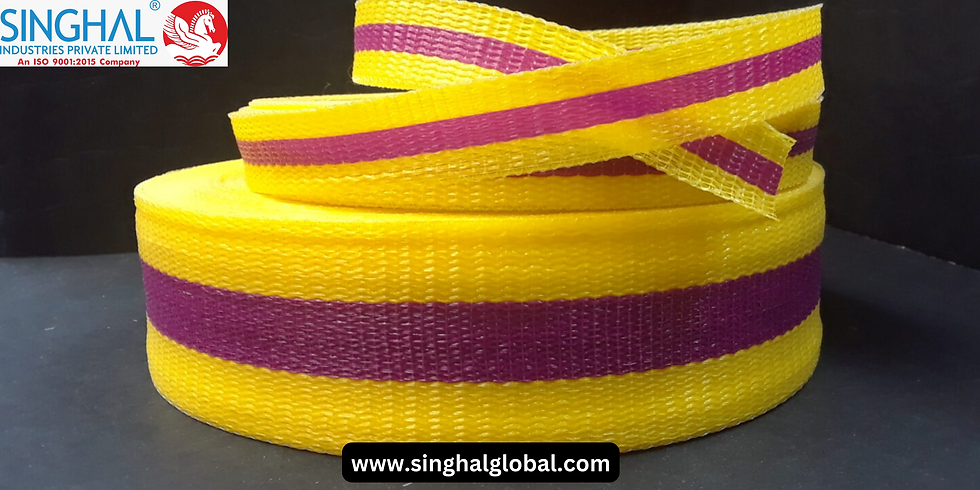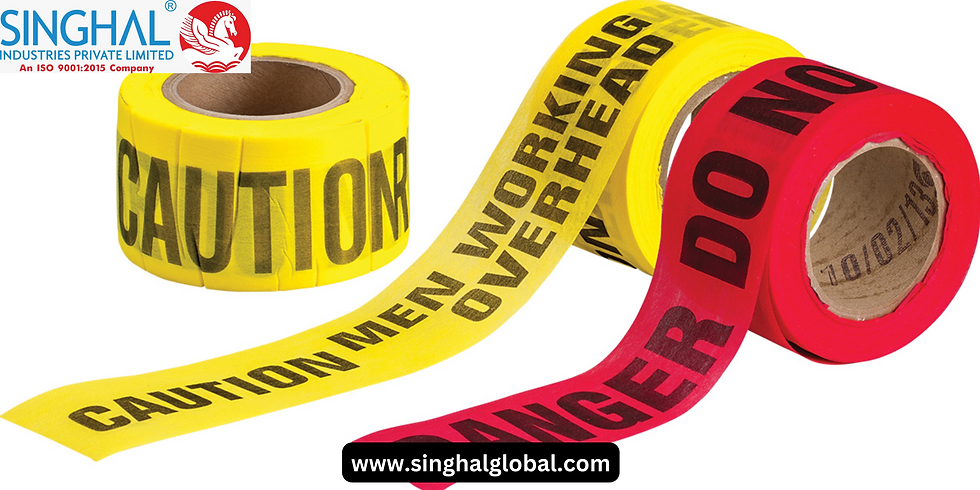HDPE Plastic Bags Exposed: Shocking Facts You Need to Know
- singhalglobal group

- May 27, 2023
- 5 min read
Updated: Apr 13, 2024
Introduction:
Plastic bags, especially those made from high-density polyethylene (HDPE), have become an integral part of our daily lives. However, it is essential to shed light on the alarming impact of HDPE plastic bags on our environment and human health. In this article, we will uncover some shocking facts that underline the need to address the issue of HDPE plastic bags.

Environmental Impact:
HDPE plastic bags pose a significant threat to the environment due to their non-biodegradable nature. They can persist in landfills for hundreds of years, contributing to the growing problem of plastic waste. These bags often end up in oceans and waterways, where they harm marine life through ingestion or entanglement. The decomposition of HDPE bags releases harmful chemicals into the soil and water, further polluting the ecosystem.
Single-Use Culture:
One of the major issues with HDPE bags is their prevalent use as single-use items. People often use them once and then discard them, leading to a massive consumption rate. The convenience they offer is short-lived compared to the long-term damage they cause. Encouraging a shift towards reusable bags can significantly reduce the demand for HDPE plastic bags and alleviate the associated environmental concerns.
Energy Consumption and Carbon Footprint:
The production process of HDPE plastic bags requires substantial amounts of energy and resources. From extracting raw materials to manufacturing and transportation, every step contributes to the carbon footprint. Furthermore, the burning or incineration of plastic bags releases greenhouse gases and toxic pollutants into the atmosphere, exacerbating climate change and air pollution.
Health Risks:
While the environmental impact of HDPE plastic bags is concerning, their adverse effects on human health should not be overlooked. Some HDPE bags contain additives such as phthalates and bisphenol A (BPA), which have been linked to hormonal disruptions, developmental issues, and even cancer. These chemicals can leach into food or beverages stored in plastic bags, posing a potential health risk to consumers.

Microplastics:
As HDPE plastic bags degrade over time, they break down into smaller particles known as microplastics. These tiny plastic fragments infiltrate ecosystems, including soil, water bodies, and even the air we breathe.
Microplastics have been found in marine organisms, leading to bioaccumulation and potential threats to the entire food chain. The long-term consequences of microplastic exposure on human health are still being studied, but the initial findings raise concerns.
Alternatives and Solutions:
To combat the detrimental effects of HDPE plastic bags, various alternatives and solutions have emerged. Reusable bags made of natural fibers, such as cotton or jute, are eco-friendly options that can be used repeatedly.
Additionally, promoting awareness and education about the environmental impact of plastic bags can encourage individuals to make more sustainable choices. Governments and businesses can implement policies and initiatives to reduce the production and consumption of HDPE plastic bags.
Conclusion:
The shocking facts surrounding HDPE plastic bags highlight the urgent need for change. From their severe impact on the environment to potential health risks, it is clear that relying on these bags as a staple of our daily lives is unsustainable.
We must take collective action to reduce our reliance on HDPE plastic bags, embrace reusable alternatives, and support initiatives that promote a greener and healthier future for our planet and ourselves. Remember, the choices we make today will shape the world we leave behind for future generations.
Plastic bags, especially those made from high-density polyethylene (HDPE), have become an integral part of our daily lives. However, it is essential to shed light on the alarming impact of HDPE plastic bags on our environment and human health. In this article, we will uncover some shocking facts that underline the need to address the issue of HDPE plastic bags.
Environmental Impact:
HDPE plastic bags pose a significant threat to the environment due to their non-biodegradable nature. They can persist in landfills for hundreds of years, contributing to the growing problem of plastic waste. These bags often end up in oceans and waterways, where they harm marine life through ingestion or entanglement. The decomposition of HDPE bags releases harmful chemicals into the soil and water, further polluting the ecosystem.

Single-Use Culture:
One of the major issues with HDPE plastic bags is their prevalent use as single-use items. People often use them once and then discard them, leading to a massive consumption rate. The convenience they offer is short-lived compared to the long-term damage they cause. Encouraging a shift towards reusable bags can significantly reduce the demand for HDPE plastic bags and alleviate the associated environmental concerns.
Energy Consumption and Carbon Footprint:
The production process of HDPE plastic bags requires substantial amounts of energy and resources. From extracting raw materials to manufacturing and transportation, every step contributes to the carbon footprint. Furthermore, the burning or incineration of plastic bags releases greenhouse gases and toxic pollutants into the atmosphere, exacerbating climate change and air pollution.
Health Risks:
While the environmental impact of HDPE plastic bags is concerning, their adverse effects on human health should not be overlooked. Some HDPE bags contain additives such as phthalates and bisphenol A (BPA), which have been linked to hormonal disruptions, developmental issues, and even cancer. These chemicals can leach into food or beverages stored in plastic bags, posing a potential health risk to consumers.
Microplastics:
As HDPE plastic bags degrade over time, they break down into smaller particles known as microplastics. These tiny plastic fragments infiltrate ecosystems, including soil, water bodies, and even the air we breathe. Microplastics have been found in marine organisms, leading to bioaccumulation and potential threats to the entire food chain. The long-term consequences of microplastic exposure on human health are still being studied, but the initial findings raise concerns.
Alternatives and Solutions:
To combat the detrimental effects of HDPE plastic bags, various alternatives and solutions have emerged. Reusable bags made of natural fibers, such as cotton or jute, are eco-friendly options that can be used repeatedly.

Additionally, promoting awareness and education about the environmental impact of plastic bags can encourage individuals to make more sustainable choices. Governments and businesses can implement policies and initiatives to reduce the production and consumption of HDPE plastic bags.
Advantages of HDPE Bags
HDPE bags do have certain advantages, including their durability and strength. They are lightweight and easy to carry, making them convenient for shopping or other purposes. HDPE bags are also water-resistant, which can protect the contents from moisture.
Additionally, these bags are recyclable, and when properly managed, they can be transformed into new products. However, it is important to weigh these advantages against the environmental impact and potential health risks associated with HDPE bags to make informed choices about their use.
Conclusion:
The shocking facts surrounding HDPE plastic bags highlight the urgent need for change. From their severe impact on the environment to potential health risks, it is clear that relying on these bags as a staple of our daily lives is unsustainable.
We must take collective action to reduce our reliance on HDPE plastic bags, embrace reusable alternatives, and support initiatives that promote a greener and healthier future for our planet and ourselves. Remember, the choices we make today will shape the world we leave behind for future generations.
Author bio
hdpe bags manufacturers, hdpe woven bags, hdpe plastic bags, hdpe fabric, plastic bag 50 kg, hdpe bags full form
Singhal Industries Pvt. Ltd. is the best Fibc bulk bag manufacturer in the country. If you are planning to purchase any kind of bag, then you can also choose from these PP Jumbo Bags, PP Woven Bags, Woven PP Bags, HDPE Bags, PP Woven Bag Manufacturers, HDPE Plastic Bags,spunbond nonwoven fabric, u panel fibc bags, ventilated bulk bags, un certified bags, conical fibc bags, etc.
Useful Articles link



Comments